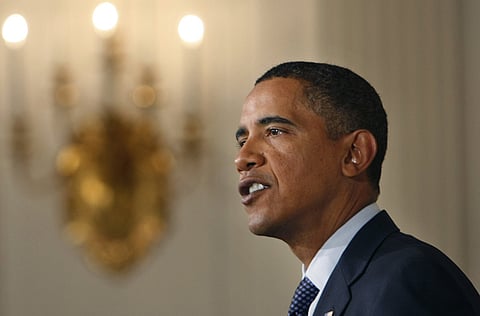We must do what we can to help Obama
Sooner or later the US president will tire of fighting Israel on behalf of the Palestinians

Since US President Barack Obama assumed office, no significant changes have taken place in relation to the Palestinian question. This is in spite of continued efforts exerted by the US administration in taking an unequivocal stance towards Israel, because the latter refuses to respond by halting colony construction.
Arabs — and perhaps the world — are still watching Obama, relieved by his declarations but awaiting real action. The American president's strategy focuses on a comprehensive peace, not only between the Palestinians and Israelis, but also with Arab and Muslim countries.
It is true that each president is limited by his own agenda, which is informed by strategic American interests, and possibly in line with whatever policies special interest groups put forth. But Obama, who is clearly in favour of a two-state solution, has enough latitude in which to act, especially since he is enthusiastic about doing something tangible to find a solution to the Palestinian question.
To this end, he keeps repeating that it is necessary for Israel to cease its colonisation activities, vacate illegal colonies and facilitate a normal life for Palestinians.
As we watch his attempts to find a solution for this chronic conflict — something that requires great effort, not only time — we hope his enthusiasm will not fade in the face of Israeli resistance. The creation of a Palestinian state is a strategic American interest.
If Obama were to ignore this, it would have negative ramifications for US credibility. This is why the US insists on "confidence building" between the Palestinian National Authority and Israel.
While Obama has an obligation to call for the creation of a viable Palestinian state, he faces resolute resistance from an extremist, right-wing Israeli government that is expanding its colonisation of the West Bank, and Occupied Jerusalem in particular.
Here one must ask: What can we do to help Obama translate his good intentions into action? Eventually, he will tire of fighting Israel on behalf of the Palestinians, the Arabs or the Muslims. Besides, who will give us due respect if we do not fight for our cause?
Unity
Our top priority must be bringing an end to the rift between Fatah and Hamas, especially after the turmoil the Goldstone Report caused in Palestinian circles. This has negatively affected efforts at reconciliation and deepened the divide, which Israel is keen on maintaining.
While the Palestinian National Authority (PNA) will not entertain negotiations until a complete halt to colony construction has been effected, reconciliation is most urgent now — especially since any delay risks the division of the homeland forever into a West Bank and a Gaza Strip, each independent of the other.
Secondly, we need to signal that we are seriously considering dismantling the Palestinian National Authority, which would be a nightmare for Israel due to the problems this would create.
Redeployment
The most important of these problems is that the Israeli military would have to be redeployed in Palestinian areas. This would impose further burdens, such as necessitating security measures to protect Israeli personnel administering civil activities such as education, health, transportation, water and electricity.
This would also necessitate finding foreign — specifically, Western — financiers for the above. Add to this the political expense, with the occupation being forced once again to wear its ugly old face, which has been hidden since the creation of the PNA, giving the impression that the conflict is one between two states, instead of being between an occupier and the occupied.
Thirdly, given the recession of armed resistance and the popularity of the Bili'n-Ni'lin model, peaceful resistance is gaining more ground against the occupation and its various policies. These are indications of the possibility of a new intifada, which could gradually gain momentum and develop into an uprising.
This might reveal who is really fighting for our cause and expose the phony orators. Our previous experiences show that it is very difficult for the occupation to deal with an uprising, particularly when it is non-violent. This would also embarrass the already unpopular Israeli government.
The negotiation merry-go-round has stopped and Palestine is suffering from a clear-cut policy of Israeli apartheid, a policy that is likely to be strengthened as long as the right-wing Netanyahu government is in power.
Even if negotiations resumed, Israel would probably just use them to buy time, while continuing its policies of colonisation and Judaisation. In any case, Israel is not eager to resume negotiations. In fact, it has pushed the Palestinians towards boycotting negotiations.
Therefore, we, Palestinians, Arabs and Muslims, must once again stand together on the world stage. Neither Obama nor anybody else can fight on our behalf.
Professor As'ad Abdul Rahman is the chairman of the Palestinian Encyclopaedia.


